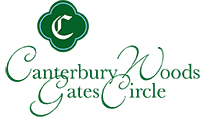Retired seniors who are considering their financial future are, unsurprisingly, concerned about protecting their assets so they can live comfortably and pass on as much of their estate as possible to their descendants. When looking into senior living communities – and in particular, the entrance fee that comes with moving into a Life Care Community – some may believe that the up-front and continued costs of living in a community would outweigh the benefits.
“What many people don’t realize is that moving into a Life Care Community presents many tax benefits,” says Lynda Marino, Marketing Director of Canterbury Woods Gates Circle, a Life Care Community in Buffalo, NY. “Not only that, but we consider moving to a Life Care Community an investment in the future. From the services and amenities, the maintenance-free lifestyle, and a vibrant social scene to the security of Life Care, you’re putting a down payment on peace of mind while managing your future health care costs.”
What Is Life Care?
Life Care is an agreement that residents enter into when they move to a Life Care Community such as Gates Circle. Life Care provides comprehensive care – independent living, assisted living, memory care and even skilled nursing – for the resident’s life, no matter how their health needs may change in the future.
Generally, new residents pay an up-front deposit plus a one-time Life Care fee upon entry to the community. This, along with your monthly fee, guarantees you residency for life. Residents pay fixed, predictable monthly fees and enjoy financial security, protection from rising health care costs, preservation of financial assets, potential tax advantages and permanent care and residency. Canterbury Woods Gates Circle offers three different contract arrangements to ensure that Life Care is affordable and meets your needs.
The Tax Benefits of Life Care
2020’s tax laws state that individuals who choose to itemize taxes are able to deduct medical expenses exceeding 10 percent of their adjusted gross income (AGI). As it turns out, there are many expenses from living in a Life Care Community that qualify as medical expenses.
The first expense is your nonrefundable entrance fee. The IRS considers this as a “prepayment” for future health care needs, making it for medical services. In other words, it’s tax deductible – and depending on how much you pay, that can be significant.
The second group of expenses you can deduct are a portion of your monthly fees. That’s because, just like your entrance fee, there are portions that are specifically for health care costs (even if you aren’t necessarily actively using them).
The third group of expenses include medical prescriptions, doctor’s visits, health insurance premiums and other medical-related expenses.
At Canterbury Woods Gates Circle, we understand that you have options when it comes to senior living lifestyles, and we understand that moving to a Life Care Community is a big decision. What makes our community unique is the opportunity for our residents to be part of the future of senior living. Our state-of-the-art community is set in a true intergenerational neighborhood with easy access to all the vibrancy and culture that downtown Buffalo has to offer. Our Life Care services provide exceptional senior living experiences of quality and comfort with security and peace of mind.
Continuum of Care
As a Life Care Community, Canterbury Woods Communities provide a comfortable environment and first-rate services to support every level of need. Assisted living apartments allow Gates Circle residents to benefit from additional support while maintaining their independent lifestyle. If skilled nursing, rehabilitation or memory care is ever needed, residents can experience the support they require at our sister community in Williamsville.
Contact us today to discover more about Canterbury Woods Gates Circle! (716) 427-6678





